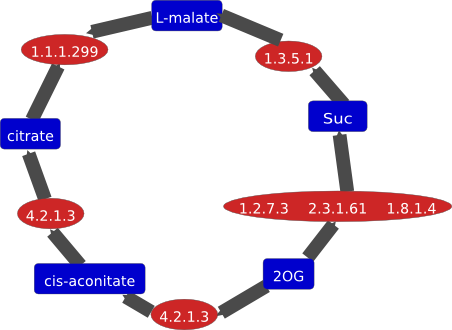EC Number   |
Disease   |
PubMed ID   |
Title of Publication   |
Category   |
Confidence Level   |
|---|
    6.3.4.21 6.3.4.21 | Glioblastoma |
19703994 |
The small molecule GMX1778 is a potent inhibitor of NAD+ biosynthesis: strategy for enhanced therapy in nicotinic acid phosphoribosyltransferase 1-deficient tumors. |
causal interaction
diagnostic usage
ongoing research
therapeutic application |
4
1
1
4 |
    6.3.4.21 6.3.4.21 | Neoplasms |
19703994 |
The small molecule GMX1778 is a potent inhibitor of NAD+ biosynthesis: strategy for enhanced therapy in nicotinic acid phosphoribosyltransferase 1-deficient tumors. |
causal interaction
diagnostic usage
ongoing research
therapeutic application |
4
1
1
4 |
    6.3.4.21 6.3.4.21 | Neuroblastoma |
19703994 |
The small molecule GMX1778 is a potent inhibitor of NAD+ biosynthesis: strategy for enhanced therapy in nicotinic acid phosphoribosyltransferase 1-deficient tumors. |
causal interaction
diagnostic usage
ongoing research
therapeutic application |
4
1
1
4 |
    6.3.4.21 6.3.4.21 | nicotinate phosphoribosyltransferase deficiency |
19703994 |
The small molecule GMX1778 is a potent inhibitor of NAD+ biosynthesis: strategy for enhanced therapy in nicotinic acid phosphoribosyltransferase 1-deficient tumors. |
causal interaction
diagnostic usage
ongoing research
therapeutic application |
4
1
1
4 |
    6.3.4.21 6.3.4.21 | Sarcoma |
19703994 |
The small molecule GMX1778 is a potent inhibitor of NAD+ biosynthesis: strategy for enhanced therapy in nicotinic acid phosphoribosyltransferase 1-deficient tumors. |
causal interaction
diagnostic usage
ongoing research
therapeutic application |
4
1
1
4 |
    6.3.4.21 6.3.4.21 | Neoplasms |
20515945 |
A preclinical study on the rescue of normal tissue by nicotinic acid in high-dose treatment with APO866, a specific nicotinamide phosphoribosyltransferase inhibitor. |
causal interaction
therapeutic application
unassigned |
4
4
0 |
    6.3.4.21 6.3.4.21 | Lymphoma |
21492230 |
Expression patterns of nicotinamide phosphoribosyltransferase and nicotinic acid phosphoribosyltransferase in human malignant lymphomas. |
causal interaction
diagnostic usage
ongoing research
therapeutic application |
4
3
4
4 |
    6.3.4.21 6.3.4.21 | Glioblastoma |
22570471 |
Inhibition of nicotinamide phosphoribosyltransferase (NAMPT) activity by small molecule GMX1778 regulates reactive oxygen species (ROS)-mediated cytotoxicity in a p53- and nicotinic acid phosphoribosyltransferase1 (NAPRT1)-dependent manner. |
causal interaction
therapeutic application
unassigned |
3
1
0 |
    6.3.4.21 6.3.4.21 | Neoplasms |
22570471 |
Inhibition of nicotinamide phosphoribosyltransferase (NAMPT) activity by small molecule GMX1778 regulates reactive oxygen species (ROS)-mediated cytotoxicity in a p53- and nicotinic acid phosphoribosyltransferase1 (NAPRT1)-dependent manner. |
causal interaction
therapeutic application
unassigned |
3
1
0 |
    6.3.4.21 6.3.4.21 | Neuroblastoma |
22570471 |
Inhibition of nicotinamide phosphoribosyltransferase (NAMPT) activity by small molecule GMX1778 regulates reactive oxygen species (ROS)-mediated cytotoxicity in a p53- and nicotinic acid phosphoribosyltransferase1 (NAPRT1)-dependent manner. |
causal interaction
therapeutic application
unassigned |
3
1
0 |





